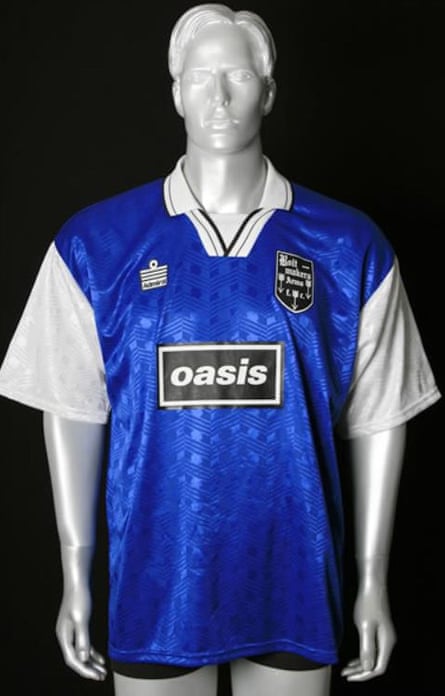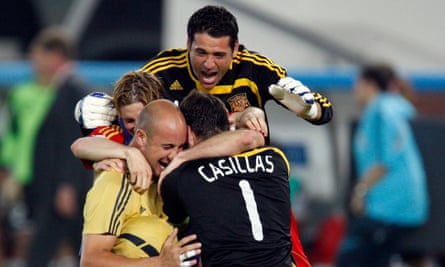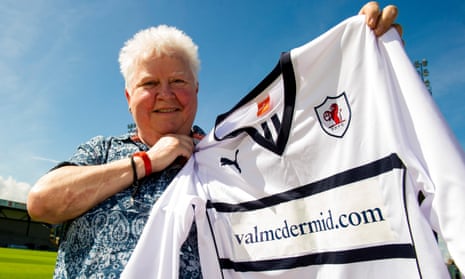“Guitar-toting indie tyro Jake Bugg is sponsoring Notts County’s kit throughout November. Is this the first time an individual has been a professional club’s shirt sponsor?” poses Gregg Bakowski.
“Gregg Bakowski need not have been a detective to find at least one previous instance of an individual personally sponsoring a strip,” quips Raith Rovers fan Iain Wallace. “Crime writer Val McDermid was Raith’s primary strip sponsor for two seasons from 2014 and her name remains emblazoned above our away stand (in memory of her father, a club scout). She also only recently stepped down from the board of directors.”
Several Knowledgeable folk have written in to point out the very same fact, thank you George Cook, Niall MacGalloway and Iain Wallace.

“Sheffield Wednesday have been sponsored by individuals on two separate occasions. Currently by Dejphon Chansiri their tuna chairman and also by some bloke called Mr Tom!” Whilst Putu Winchester is correct about Mr Chansiri, Mr Tom is a delicious peanut-based snack bar (other peanut-based snack bars are available and they may or may not be delicious). The Chansiri sponsorship was also spotted by Peter Russell.
Along the same lines as Mr Chansiri, Nick Turnbull highlights a similar circumstance at Ipswich: “Marcus Evans has been sponsoring Ipswich Town since he bought the club, which has always seemed slightly bizarre to me.” Not quite sure what Nick considers bizarre, Evans buying Ipswich or putting his name on the shirt.
Robert McHugh has a tangent but it is a good one. He writes: “Not strictly an answer, given they are not a professional club, but there was quite a stir in Keighley in the mid 90s when, at the height of their fame, Oasis sponsored local pub team, the Boltmakers Arms. It is a classic 90s kit as well.”
The Knowledge’s own contribution is along the same lines, not strictly speaking an individual but related to a lone musician. During the 2004-05 season Brighton released a special edition kit in conjunction with music label sponsors Skint to promote Albion fan Fatboy Slim’s new album Palookaville, with the album title serving as the shirt sponsor. The kit was later adopted as the official third shirt and became something of a lucky charm as Mark McGhee managed to keep the Seagulls in the second tier thanks to wins at West Ham and Sheffield United as well as unlikely draws at both Leeds and Wolves all whilst in the change navy blue strip.
Champion prime ministers
“Maidenhead United are reigning champions in National League South, sixth in the English pyramid,” cheers Kári Tulinius. “York Road stadium is within Theresa May’s constituency of Maidenhead. As far as I can tell, that is the second highest league trophy won by a club within the constituency of a sitting British prime minister, only beaten by Manchester City’s old Second Division triumph in 1903, when Hyde Road was within the boundary of Arthur Balfour’s Manchester East constituency. City were also the only team, as far as I can tell, to win the FA Cup while their MP was PM, in 1904. I could not find a national champion in Wales or Scotland either represented by a sitting PM. Did I miss something? And have any other countries with first-past-the-post single-member-district electoral systems featured a national football champion being represented by a sitting prime minister or premier or whatever?”
This requires not only a deep dive into the pantheon of champions but also a thorough investigation of worldwide electoral constituency borders. Step forward Oliver Raven with this fabulous submission: “To answer this we have to discount some countries that use presidential systems since in those the head of government does not have a constituency, but we do not have to disregard all countries that do not use FPTP (first past the post). France’s two-round system and Australia’s preferential one still rely entirely on single-member districts for their lower houses, whilst a significant proportion of Germany and New Zealand’s legislatures are chosen by simple plurality voting – as do the dubious methods employed in Hungary and Japan.
“Outside of those, only India and some less developed countries in Africa and the Caribbean are left. Unfortunately it can be difficult to find information in those cases on both the exact location of the national soccer champion’s home ground and the precise limits of parliamentary constituency boundaries (especially at state/union territory level in India, since chief ministers also count).
“We do not have to rely on the fact that the question setter says that premiers are omitted, though. It is to Australasia that we can turn for some success stories for federal and nationwide political leaders.
“Long before the A-League was established, a Melbourne-area team called Brunswick Zebras (then known as Brunswick Juventus) won the 1985 National Soccer League. Their stadium, Sumner Park, appears to fall just inside the current borders of the Division of Hawke. At the time, that constituency was represented Bob Hawke of the Labor Party, who also happened to be the prime minister of Australia. The Zebras, meanwhile, will be playing in the Victoria State League Division 5 North in 2018.
“The story was repeating itself very recently indeed as current PM Malcolm Turnbull of the Liberals represents the Division of Wentworth, which contains the Sydney suburb of Moore Park, where 2017 champions Sydney FC play their home matches at a ground known at the moment as the Allianz Stadium for sponsorship purposes.
The Prime Minister congratulating @vuka20 and @SydneyFC on winning the A-League Grand Final last night. pic.twitter.com/ThAqijXT5F
— The PMO (@thepmo) May 8, 2017
“Across the Tasman Sea, the Mount Albert electorate is also represented by a sitting Prime Minister, namely Jacinda Ardern of Labour but as she’s only been PM for a few weeks, there hasn’t been a Kiwi football championship decided in that time. More relevant is the fact that the seat includes both Eden Park and the less famous sporting venue of Kiwitea Street, home of Auckland City FC. They were champions of New Zealand in the 2004-05, 2005-06 and 2006-07 seasons, all while their incumbent MP was Labour’s Helen Clark. As an added bonus, somewhere in the middle of all that they won their first Oceania Champions League as well.
“Sadly I could not find any such luck for Canadian heads of the executive branch, even at the provincial level. I tried cheating by widening the criteria to take in ice hockey and that country’s own peculiar code of football, but to no avail. Montréal Impact’s stadium is agonisingly situated less than a 10-minute drive from Justin Trudeau’s riding. Then again, they have failed to win anything during his two years as Prime Minister so far anyway!
“Lastly, in Germany, the CDU’s Walter Wallmann might well have held a constituency encompassing the stadium of Eintracht Frankfurt during their most recent moment of glory in 1988, but it is tough to verify that because there is astonishingly (as well as frustratingly) little easily searchable and available constituency-level information online for state-level elections in West Germany from the pre-digital era.”
Kudos to Alexander Scott who provided less detail but also pointed out that Turnbull’s seat was home to Sydney FC.
Knowledge archive

“Spanish goalkeeper Andrés Palop has a gold medal for winning Euro 2008 but has no caps. Is this unique?” mused Robert Abushal in 2013.
“No,” says David Lucardi. “In the 1934 World Cup the Italian team took four players (Pietro Arcari, Giuseppe Cavanna, Guido Masetti and Mario Varglien) without a single cap at the time the tournament began. In the following years Masetti and Varglien did play for their national side but the Milan forward Arcari and Cavanna, a Napoli goalkeeper, never played for the glorious Azzurri’s team of the Thirties. Coach Vittorio Pozzo did it again in 1938, calling up five players without a cap at the time. One of them, Bologna’s right-winger Amedeo Biavati, earned a starting place in France, while Mario Genta and Renato Olmi earned caps in some matches in 1939-1940, but the other two (Triestina’s Bruno Chizzo and Bologna’s Aldo Donati, both midfielders) never played for Italy. So, there’s at least four players who became World Champions without a single cap.”
Despite extensive but not necessarily absolutely exhaustive digging through our most far-reaching international archives, the Knowledge has come up with no evidence that the 1950 Uruguay medal-winners William Pablo Martínez and Washington Orturio ever won a cap, while we are fairly certain that Hector Zelada, Argentina’s third goalkeeper in 1986, never played for his country. Paul Steiner came the closest anyone could possibly come to joining that list without actually making it, coming on as a substitute to make his international debut at the age of 33 in a friendly against Denmark. He was a surprise selection for West Germany’s 1990 World Cup squad but never made it as far as the pitch. Brazil’s Jair da Costa beat him by a nose, given that he actually started his only international – a 3-1 victory over Wales in São Paulo in May 1962, shortly before he secured himself a World Cup medal.
Can you help?
“I’m sure you’re as keen a follower of Yr Seintiau Newydd (aka Welsh champions TNS) as I am, and are fully aware of their fantastic win against Queen of the South on November 12 in the Irn-Bru Cup quarter final,” says Algy Taylor.
“It got me thinking. The World Cup final and European Championships finals are both shown simultaneously on two domestic TV channels (BBC & ITV). But, if we get a final with TNS against a Scottish team (say TNS vs Dumbarton), that would also join them as it’ll be televised on both BBC Alba and S4C.
“It made me wonder, is it only the three massive games (World Cup final, European Championships final & Scottish League Challenge Cup final) that enjoy being simultaneously broadcast by two separate stations in the same country?”
“I was wondering, historically, what the best seed (FIFA Rankings) to be, to win a World Cup? Is it the first seed or something more random, like sixth?” Regards, Mike Britton.
Can't be many games where away support outnumbers home support - @TheKnowledge_GU? https://t.co/XYZ3kZLexD
— Dylan Mitchell (@build_a_fire) November 18, 2017
“Which derby-match teams have to change to their away/change/third strip when they play? I am thinking that most of these blood feud teams deliberately chose colours nothing like their rivals, so there perhaps are not many.” Cheers, Colin Harris.
“In the light of next year’s World Cup taking shape, I spent the international break reliving the last World Cup and noticed that Argentina scored their last goal in the competition in the eighth minute of their quarterfinal game against Belgium. Despite this, they came within minutes of a penalty shoot-out in the final, which they may well have won. My first question is what was the longest goalless run of any winning team at a major competition? And my second question is, given that Argentina went without a goal for a total of 322 minutes (they played extra time in both the semifinal and the final), and this is longer than being eliminated in the group stage without scoring, was this the longest goalless run of any team in any major competition ever?” Thanks, Boris Cule, Antwerp, Belgium.
- Send questions and answers to knowledge@theguardian.com or tweet @TheKnowledge_GU
